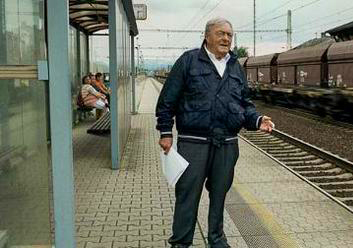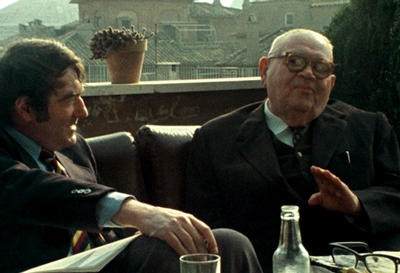
 |
|
|
|
Surely the most thorough documentarian of the Holocaust is Claude Lanzmann, whose monumental film Shoah could not include several interviews into its already marathon 9.5-hour running time. A week's worth of interviews, filmed in 1975, are with an Austrian Rabbi named Benjamin Murmelstein, who had been Adolf Eichmann's puppet bureaucrat in the creation and maintenance of Theresienstadt, the model Ghetto known as "The town given to the Jews by Hitler". The Nazis used Theresienstadt for tours by neutral observers, particularly The Red Cross, as a cynical trick to fool the outside world about the true nature of the Final Solution. Murmelstein came from Vienna, where since 1938 he had been forced to carry out Eichmann's bureaucratic orders. At first Murmelstein aided in securing ways for Austrian Jews to emigrate to any country that would take them -- England, Colombia. Once installed in Theresienstadt, Murmelstein became the third and final 'Elder of the Jews' to take charge of the ghetto -- his two predecessors were killed before the job fell on his shoulders in the middle of the war. After having worked with Eichmann and wasn't murdered like most of the other ghetto leaders, it was assumed by many that Murmelstein was the lowest of collaborators. Some wanted him tried alongside the Nazi war criminals, but Czechoslovakia cleared him. He lived out his life quietly in Rome. Surprisingly,Israel didn't call him to serve as a witness at Eichmann's trial at the beginning of the 1960s. 
Assembled and finished long after Murmelstein's death, Lanzmann's 2013 The Last of the Unjust combines the lengthy 1975 interview material with new (2012) footage of Lanzmann in Theresienstadt reading from letters and historical statements. We begin with a lengthy stretch of film showing the elderly director waiting on a platform as several trains rush by; the scene seems to be telling us that the present doesn't pay attention to efforts to uncover the truth about the past. Lanzmann is much more visible here than he was in Shoah and we see him both when he was fifty and just a few years ago. Filmed in Rome, the Murmelstein interview shows Lanzmann being thorough in his questioning but not as aggressive as with other witnesses. Speaking in German, the intelligent ex- Jewish Elder has an excellent memory at age 70 and is extremely articulate. His answers and explanations are candid and come with many explanatory digressions. The four-hour film paces its lengthy interview segments with a few equally slowly paced images of Lanzmann walking among ruins, plus a couple of new scenes in which Rabbis recite and Cantors sing. We also see a few photos along with many artworks drawn and painted by artists imprisoned in Theresienstadt. The movie works through memory, its recollections, arguments, reasoning and self-justifications filtered through the past tense. Our opinion of Murmelstein develops throughout. He'll characterize himself as a helpless pawn but also with a main with special powers. He claims that he did his best to carry out Eichmann's wishes in such as way that would keep the ghetto intact as much as possible: if it failed in its evil function to provide a smokescreen for the mass murders in the East, some other site would have become the 'model ghetto' and the thousands under Murmelstein's care would have been shipped to their final destination. This made the Elder a hated and feared individual. He explains how he curbed various forms of corruption in the Ghetto and how he took better care of the elderly. He helped to stage the fake visits and helped produce the phony film showing the 'happy citizens' of Theresienstadt working and singing. In a place where only survival counted, he claims that he never did the work of the Germans and never selected those to be shipped out. He did clamp down on individual building leaders that tried to play favorites with the names on lists. 
Murmelstein doesn't deny that he was witness to and accepted the Nazis' cruelty, but only because he had no choice. When he was the final Elder for the camp there were no replacement candidates, which is why he was able to get away with things his predecessors did not. But the facts of life and death did not change. Although living conditions were far better in Theresienstadt than in the other camps, Jews were still executed for minor offenses. Hanging was the punishment for every kind of crime or infraction. The Nazi terror was of course motivated to blot out any hint of rebellion. Murmelstein tells of many individual incidents, most with terrible endings. At one point a large number of younger male prisoners were culled out and sent East, just to ease the Nazis' worry that there might be rebels among them. When some children from the East were brought to Theresienstadt to recover from sickness, they were kept separate from the rest of the ghetto and quietly murdered. Murmelstein was ordered to select special escorts for another group of children who he was told were to be deported to the West. It was a ruse -- both the children and the adults that accompanied them were sent East for extermination. That kind of treachery was the norm. Many of the Austrian Jews that first came to Theresienstadt signed up to go to a special model community, willingly paying fees to do so. The primary reason these Jews of property and stature hadn't earlier fled Austria was the impossibility of keeping families together. They rode to the camp in normal coaches, and only when they arrived did they discover how harsh their treatment would be.
Murmelstein and interviewer Lanzmann develop a cozy rapport that eventually begins to worry us. Murmelstein is able to tell his version of all events without danger of being contradicted: he's the only survivor who knows what it was like to work with Eichmann, the last Elder standing. He could be lying at any time, cleverly 'confessing' to smaller infractions to avoid admitting greater crimes. Yet he's so consistent and his arguments so logical that we're for the most part won over. His highly intelligent opinions are always based on reasonable sounding first-hand knowledge. He scoffs at the "banality of evil" thesis proposed by the controversial Hannah Arendt, arguing that there was nothing at all banal
Murmelstein treats his interview as a sort of last testament, and his most quotable sentences do not seek absolution for his deeds: "In Theresienstadt there were no saints. There were martyrs, but martyrs are not necessarily saints." He's the last of the last, and there are no more witnesses left who knew as much as he. Already an old man, he's persuasive and logical, and never contradicts himself. 'Interview testimony' films like Shoah, The Sorrow and the Pity and Hôtel Terminus challenge the viewer to observe witnesses closely to catch them in lies and evasions; a major part of the horror of those films is hearing scoundrels, prevaricators and hypocrites trip over their own lying tongues. The Last of the Unjust places us in moral judgment of both the Last Elder and the documentarian who eventually offers a sign of acceptance. Claude Lanzmann knows that despite his best efforts, he can't have gotten the whole story correct -- when will his work be judged? The Cohen Media Group's Blu-ray of The Last of the Unjust is a fine encoding of this remarkable, irreplaceable film document: would that it could have been possible to record equally insightful testimony from other key people in history. Every famous person seems intent on projecting a chosen self-image. It's not practical to expect them to apply the level of self-examination over such traumatic events, as Benjamin Murmelstein. 
Lanzmann's film has been beautifully encoded. The 16mm sources (presumably the vintage interviews) and the newer 35mm source material both look excellent, and the sound is clear as well. The pressure on the cameramen not to ruin irreplaceable testimony must have been daunting. The movie is like a living transcript. The film is wisely spread across two Blu-ray discs, with a breaking point at the end of one interview segment. The extras are a gallery of stills, a brief interview with Claude Lanzmann and a trailer. The disc content is so important that it is a wise choice to refrain from including outside analysis.
On a scale of Excellent, Good, Fair, and Poor,

The version of this review on the Savant main site has additional images, footnotes and credits information, and may be updated and annotated with reader input and graphics.
Review Staff | About DVD Talk | Newsletter Subscribe | Join DVD Talk Forum |
| ||||||||||||||||||